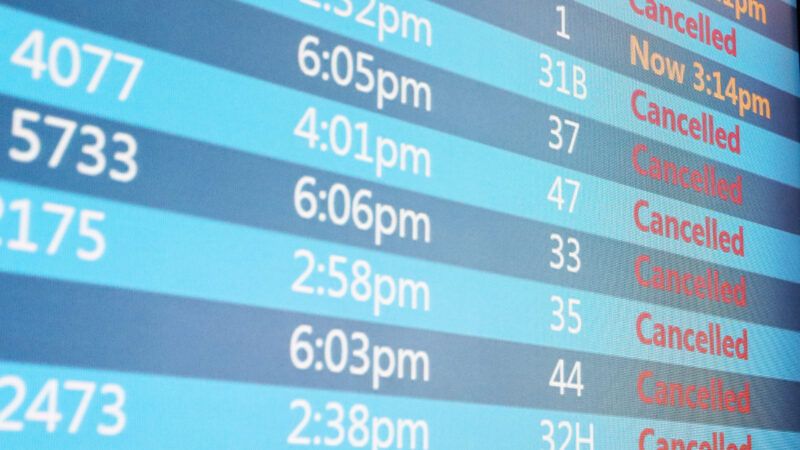Government Ruins Yet Another Holiday Travel Weekend
Phantom thunderstorms scotch thousands of flights, because the FAA sucks.

The weather in New York City was sunny and humid when JetBlue informed me via a terse email Tuesday morning that my Wednesday afternoon flight back home from California had been unceremoniously nuked.
"We've made some changes to our schedule resulting in the cancellation of your upcoming flight," Customer Experience Operations Director Kate Hart wrote.
Puzzled, I made a rare vacation toe-dip into the horrors of Google News and saw through Gothamist that "NYC airports cancel, delay hundreds of flights during third day of storms."
"Thunderstorms?!" my wife texted back. "They've been telling us about storms for 5 days now and when it rains, it barely rains." I looked at the weather forecast, and sure enough, it showed "partly cloudy" in New York for most of the next 48 hours, with a five-hour window on Wednesday between 2 p.m. and 7 p.m. during which there would be a chance of thunderstorms between 33 percent and 49 percent. My flight had been scheduled to arrive in Newark just before 10 p.m.
Let us grant that weather forecasting is not an exact science. Surely, modern air travel can nevertheless cope with a five-hour window of even severe thunderstorms without wiping out hundreds of flights and stranding passengers for days?
Since the JetBlue website has roughly the same functionality as a GeoCities page, it took most of an estimated 129-minute hold time with the airline's call center before the mystery was solved. There would be no available flights from Southern California to the East Coast for the next five days, I was told. Seems a bit extreme for a brief weather event, I countered.
"It's not the weather," my designated human reported back. "It's the FAA."
The Federal Aviation Administration, which has an operational monopoly on America's technologically antiquated flight-control system, does not have enough air traffic controllers to meet consumer air travel demand, particularly in the New York City area. It's the old, you-had-one-job meme, only this time ruining thousands of holiday plans, business trips, and family reunions.
"The FAA frankly failed us this weekend," United Airlines CEO Scott Kirby wrote in an internal email this week, after the agency limited flights to United's hub in Newark by 75 percent outbound and 40 percent inbound. "[Weather] is something that the FAA has historically been able to manage without a severe impact on our operation and customers."
A Department of Transportation Inspector General report released just last week found that the FAA "continues to face staffing challenges and lacks a plan to address them, which in turn poses a risk to the continuity of air traffic operations." And the numbers are brutal: "We determined that 20 of 26 (77 percent) critical facilities are staffed below the Agency's 85-percent threshold, with New York Terminal Radar Approach Control (TRACON) and Miami Tower at 54 percent and 66 percent, respectively."
Translation: If it rains in Miami and New York, bring your sleeping bag to LAX.
As ever, the federal government should be listening to American hero Robert Poole—the transportation policy director of the Reason Foundation, which publishes this site—who wrote in yesterday's New York Post, "These problems have been festering for years, but neither Congress nor the FAA have addressed them." What should we be doing differently?
The problem is that the air-traffic control system is the wrong kind of organization to be housed in a federal bureaucracy.
In reality, it is a high-tech service business, best described as a public utility.
Nearly all such utilities charge their customers for the services they use; FAA doesn't. […]
Over the past 35 years, country after country has converted its air-traffic department into a public utility.
Today, air-traffic control is provided by ATC utilities in 83 countries, including Canada, whose system has newer and better technology than FAA.
So will the FAA's staffing shortages turn around any time soon? Transportation Secretary Pete Buttigieg sure doesn't think so: "I think it'll be a while before we're at levels we'd like to see," he said last month.
Until further notice, here is the reality about air travel within the United States: If it's a busy holiday weekend, and the tri-state area is even remotely involved, expect thousands of cancellations and even more splutterings of social media rage. And as ever, blame the feds.

Show Comments (44)